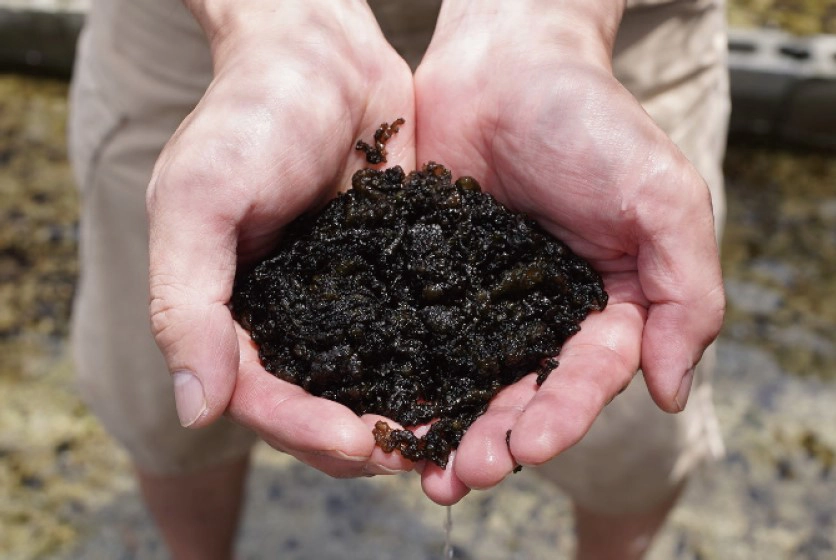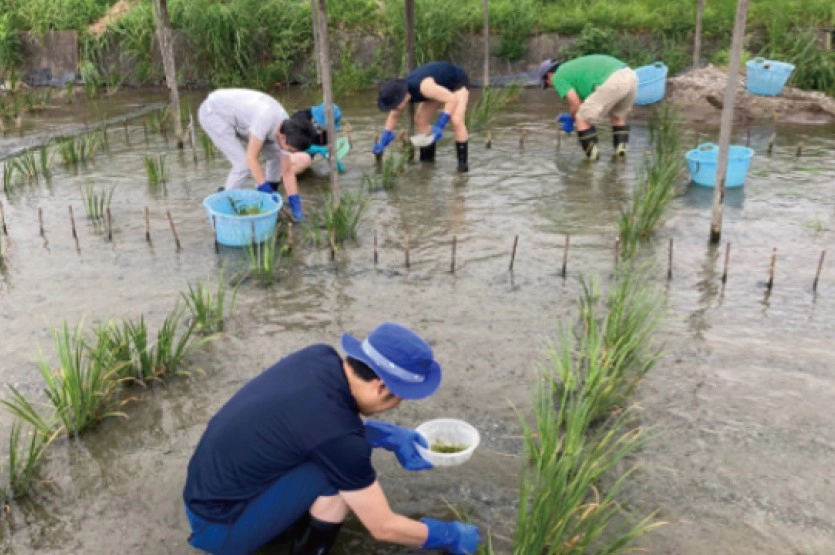Biodiversity
The DIC Group has formulated the DIC Group Biodiversity Policy. This policy outlines the Group’s responsibilities, goals and metrics for preserving biodiversity and was created with the aim of contributing actively to the conservation and protection of biodiversity while also minimizing the Group’s impact on the environment. The Group recognizes that the responsible management of biodiversity is crucial not only for the environment but also for its own success over the long term. Guided by this policy, which demonstrates its dedication to ensuring a sustainable future, the Group will work tirelessly to achieve its goals and help realize a healthier planet for generations to come.
The DIC Group Biodiversity Policy
Article 1 (Purpose)
The DIC Group is committed to environmental responsibility and sustainability. Recognizing the importance of biodiversity* in maintaining a healthy and balanced ecosystem, we are dedicated to minimizing our impact on the environment while contributing actively to the conservation and protection of biodiversity. This policy outlines our commitment to biodiversity conservation and our related goals, as well as the measures we will take to achieve them. We acknowledge that the responsible management of biodiversity is essential not only for the environment but also for the long-term success of our business. This policy is a testament to our dedication to sustainability, and we will continue to work tirelessly to achieve our goals and contribute to a healthier planet for future generations.
- “Biodiversity” is the diversity of all living things, whether from terrestrial, marine or other aquatic, complex or other ecosystems, other habitats or other growth environments and includes diversity within species, among species and of ecosystems.
Article 2 (Compliance with Laws and Regulations)
The DIC Group complies with all national and international laws and regulations concerning biodiversity preservation, environmental protection and natural resources management. When a conflict between national law and international law arises, we seek ways to respect internationally recognized rules to the extent possible.
Article 3 (Biodiversity Assessment)
The DIC Group assesses the impact of its business on biodiversity and capitalizes on the results thereof to mitigate negative effects.
Article 4 (Local Care)
The DIC Group conducts its business while minimizing damage to local habitats and ecosystems.
Article 5 (Sustainable Procurement)
The DIC Group seeks to procure raw materials, products and services in a manner that minimizes negative impacts on biodiversity. We use supplier management platforms (e.g., EcoVadis) and questionnaires to assess suppliers and encourage their corporate social responsibility initiatives.
Article 6 (Pollution Prevention)
The DIC Group employs technologies and practices that minimize the release of pollutants, chemicals and waste materials into the environment, ensuring that its operations do not harm local ecosystems. We improve downstream recyclability by applying the “5Rs”* and the principles of a circular economy.
- The DIC Group’s 5Rs (reuse, reduce, renew, recycle and redesign) describes an approach to advancing the realization of a circular economy and the reduction of carbon footprint that is incorporated into all DIC Group operations and product creation efforts.
Article 7 (Research and Technological Innovation)
The DIC Group contributes to the conservation of natural capital through biodiversity-friendly products and services, including sustainable sourcing of raw materials. We contribute to industry collaborations with the aim of achieving sustainable profits.
Article 8 (Education and Training)
The DIC Group provides education and training programs for its employees and subcontracted companies to raise awareness about the importance of preserving biodiversity. Our goal is to foster a culture of environmental responsibility across the DIC Group.
Article 9 (Reporting and Transparency)
The DIC Group maintains transparent communication regarding its biodiversity initiatives and performance. We regularly report on our progress and engage with stakeholders.
Article 10 (Continuous Improvement)
The DIC Group will regularly review and update this policy to reflect emerging best practices and evolving environmental standards. We are committed to the continuous improvement of our efforts to protect and enhance biodiversity.
Article 11 (Community Engagement)
The DIC Group engages with local communities in promoting its biodiversity preservation initiatives. Building strong relationships and understanding local perspectives enables us to work toward the common goal of protecting our shared environment.
Supplementary Provision:
- 1. This policy is established as of November 15, 2023.
Document download
TOPIC
Helping Preserve Suizenji Nori
DIC has begun working with Group company Green Science Materials, Inc. (GSM), which manufactures and sells SACRAN™,* a polysaccharide extracted from Suizenji nori, to support initiatives aimed at preserving this endangered species. Suizenji nori is a blue-green algae indigenous to Japan that because of climate change and other factors that have altered freshwater ecosystems currently grows naturally only in the Kogane River in Fukuoka Prefecture on the island of Kyushu. As a result, it has been declared endangered.
The DIC Group is the first in the world to succeed in developing a successful indoor mass cultivation technology for Suizenji nori, positioning it to contribute to conservation of, as well as to expand skincare and other applications for, this algae species. However, the Group has not stopped with research related to commercial cultivation, but has expanded its focus to include preservation of Suizenji nori’s natural habitat. In fiscal year 2023, the Group collaborated with local organizations to carry out environmental cleanup activities in and around the Kogane River, which was affected by extremely heavy rains in July 2023.
Going forward, the DIC Group will continue to leverage its indoor mass cultivation technology for Suizenji nori to advance species conservation and at the same time to provide support for initiatives aimed at preserving this endangered algae’s natural habitat, thereby contributing to biodiversity.
Related link

Suizenji nori

Environmental cleanup activity
Participation in JBIB
In April 2022, DIC joined the Japan Business Initiative for Biodiversity (JBIB), a group of Japanese companies committed to preserving biodiversity that works actively to collect up-to-date information and network with other members. As part of this initiative, the DIC Group is conducting study sessions with outside experts and companies from other industries with the objective of promoting more ambitious efforts to preserve biodiversity.

